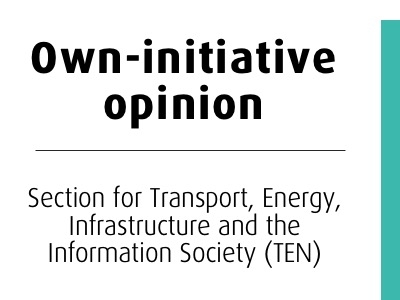European Economic
and Social Committee
Drone strategy 2.0
Background
Drone services are meant to integrate or complement existing transportation systems and contribute to decarbonisation by providing an alternative to carbon-intensive modes of transport and having a low impact on the environment.
The European Commission's Drone Strategy 2.0 is developed taking into account the European Green Deal, the Smart and Sustainable Mobility Strategy and the Digital Strategy.
It is based on a 2030 vision for the civilian and defence use of drones, and covers ten areas grouped under two main objectives: i) to build the Union drone service market, and ii) to strengthen the EU's civil, security and defence industry capabilities and synergies.
The Strategy will reinforce synergies between the civil and defence drone industries, including counter-drone technologies. This will improve the competitiveness of European industry and strengthen Europe's strategic autonomy, allowing Member States to rely on competitive drone technology of European origin.
Key points
- Key to the Drone Strategy 2.0 are two related drivers: building the EU's drone services market and strengthening European civil, security and defence industry capabilities and synergies. To encourage private investment and the development of new innovative services for various sectors, legal and technical certainty should be ensured.
- The development of the drone market requires regional and local planning that takes into account mobility as a service with a multi-domain approach. As integrated land, air and maritime dimensions could become an important factor in territorial development, proper links and coordination will be necessary with national and local authorities.
- A proper coordination between the responsible authorities has to be established quickly. To this end, the already existing systems of rules and regulations will need to interact in order for drone activity to be treated as an integral part of different business sectors. Taking into account multilevel governance, the Commission should adopt guidelines to guide industrial development.
- It is essential that a high level of physical and cyber security of drones be guaranteed, not least to ensure national security. Cyber security should also prevent the hacking of UAS (unmanned aircraft systems) communication and therefore prevent the malicious use or control of UAS. This would help maintaining the integrity and safety of urban airspace.
- As the introduction of new air mobility will most likely affect and change many aspects of our society, to ensure that maximum benefits are drawn and it gains public and political acceptance, the EU should engage in a wide competence and acceptance-building process involving all stakeholders, industrial sectors and the public.
Additional information
Section: Transport, Energy, Infrastructure and the Information Society (TEN)
Opinion number: TEN/792
Opinion type: Own-initiative
Rapporteur: Maurizio Mensi (Civil Society Organisations - Group III / Italy)
Date of adoption by section: 6 September 2023
Result of the vote: 65 in favour, 0 against, 0 abstentions
Date of adoption in plenary: 20-21 September 2023
Result of the vote: 215 in favour, 0 against, 4 abstentions
Contact
Marco Pezzani
Press Officer
Tel.: +32 2 546 9793 | Mob: +32 470 881 903
E-mail: marco.pezzani@eesc.europa.eu
Maja Radman
Administrator
Tel.: +32 2 546 9051
email: maja.radman@eesc.europa.eu
